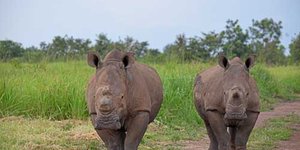Like this article?
Go on, give it a kudu!

Published on November 21 2017
Written by:
Neil
1705 views
I’ve been on over 20 African safaris. Every journey has been unique for one reason or another but one thing that ties them all together is the quality of the guide and its correlation to my satisfaction with the safari. I was recently in Zambia where, after a fantastic time in South Luangwa, I experienced a not-so-great safari in Lower Zambezi. I’m here to share my story with you and why your safari guide is so important to your experience.
After seven nights in South Luangwa, my friends and I landed at the royal airstrip that serves the west of the Lower Zambezi National Park looking forward to our four nights at a completely new camp and (for Jane and Ian) new environment.
We were met by our guide. It seems an odd thing to have started my doubts, but the question of sundowners did. Our guide said that he would take our sundowner orders on the second night … but why not on the first? We were to travel along the Zambezi by boat and then meet our guide and the vehicle within the park, as the pride of lions were quite a way down the Lower Zambezi National Park. Ian did not get his sundowner of choice on any of the four nights—at least one ingredient to his whisky and dry ginger was always missing.
The Italian couple in our group had red wine on the first night, yet on the third night he had only packed white wine. He did not once ask what our sundowner drink of choice was pre-evening drive—a guide essential. Not that one ever starves on a safari but, on one evening, the sundowner snacks were also missing.
On our first night we were hurtling towards a leopard spotting when across the airwaves came news of a pangolin sighting. A PANGOLIN SIGHTING!
When we eventually arrived at the spot it was like a circus. We were led to where the poor tim’rous beastie was cowering in the undergrowth. The attendant guides and trackers pulling back the shrubbery that the pangolin was trying to disappear into so that the clients could get better photos. Is that really ethical guiding? Another of the Chongwe camp vehicles had disgorged its passengers for a gawp. Yes, I saw a second pangolin in Africa, but I would have much rather seen one scuttle away as opposed to this one that appeared to shiver within the glare of the endless spotlight.

Two weeks to the day of our return home, we were informed by a travel agent we met in Zambia that the pangolin had not in fact been spotted on a night drive. It had been taken by poachers, and was confiscated from them in their village and released. Released? The sighting was a set-up. A totally disingenuous attempt at the WOW factor. No wonder the pangolin looked so feart. The sceptic in me wonders if the poor animal is used once a week as the camp welcomes a fresh load of visitors.
On our own last night drive we were going back to camp when a radio message caused our driver to retrace our path, but not a word to us as to what for. It was another leopard, this one stalking impalas. We sat in impassive stony silence until one of us asked if we could go back to camp, as we were interfering with the whole prey/predator dynamic by shining lights on both.
The next morning, we eventually come across the previous evening’s lions, now replete. Again, four or five vehicles jockey for position around the felines. A good driver will not only position his vehicle so that his passengers can get a great view, he’ll ensure he’s a safe distance from the wildlife and that he’s not blocking the view of other vehicles. As you can imagine, this wasn’t always the case for us.
During one lion sighting, without warning, our guide produced his phone and played an awful squealing sound. The lions seem equally nonplussed. For some reason, none of us asked what that noise is. I think we assumed it was an error as he was busy videoing. He, like all the Chongwe guides, is an avid photographer and video filmmaker. On more than one occasion, our guide is still filming once we, the paying guests, have all finished. Not all, but most guides I know either ask if it is okay if they take photographs or only photograph exceptional sightings. He did neither, and took video of everything from recumbent lions to ground hornbills.
On our second day we were again with the lions and again our guide played the squealing to the under impressed lions and guests. This time we asked him what the noise was … wait for it … the recording of a warthog being killed by a leopard. SWEET!
Neil and his party communicated their concerns with the camp. Neil also posted a few lines about Chongwe River Camp on TripAdvisor and he has received word that they are re-training their guides. Several people in his party did not feel the guide was adequate and chose not to give him a tip. It’s worth noting that tips are never obligatory and, in fact, if you feel a guide is operating in an unsafe or unethical manner, tipping him may send the wrong message. It’s always best to communicate directly with management and to let your guide know what you do and do not like.
Has been on: 10 safaris
Though born in Mauritius, some years ago, it was not until 1996 that I first went on a safari holiday. I have been back to Africa at least once every year since - a bit of an addiction. In my particular case Arthrogryposis Multiplex Congenita affects my arms and legs - most noticeably hands and feet. I hope to share experiences and how a disability does and does not affect safari travel. Named Neil Raffan Andrews I write under the name of Neil Raffan. The ease with which one can self-publish has not only allowed me to publish my back catalogue of novels but also more recent pieces which include travel writing.
© Your African Safari Ltd, All rights reserved.
Said on 24 April 2018 09:14
Couldnt agree more! As a guide of 20 years this is despicable guiding practice - the guide should be fired immediately.
Your African Safari is a safari-planning and safari review site. It was created to help support a healthy African wildlife population. All reviews are vetted before being approved and only ethical tours are published

Garamba National Park—an anchor of hope in the Democratic Republic of Congo
Published on January 09 2025
By: R.W.

Namibia imposes new visa requirements
Published on July 25 2024
By: yourafricansafari.com

Do I really need travel insurance or travel protection for my safari?
Published on July 30 2024
By: yourafricansafari.com